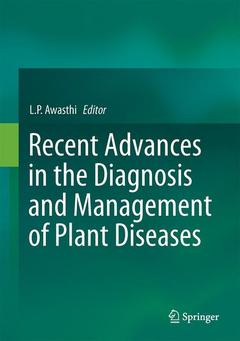Description
Recent Advances in the Diagnosis and Management of Plant Diseases, Softcover reprint of the original 1st ed. 2015
Coordinator: Awasthi L.P.
Language: English
Subject for Recent Advances in the Diagnosis and Management of Plant...:
Publication date: 11-2015
Support: Print on demand
Publication date: 08-2016
Support: Print on demand
Description
/li>Contents
/li>Biography
/li>Comment
/li>
This book is a compilation of the most challenging and significant chapters on the diagnosis and management of important bacterial, fungal, viral, viroid, phytoplasma, non parasitic diseases and various physiological disorders, in various crops. The chapters have been contributed by eminent plant pathologists, having wide experience of teaching and research on various crops with different types of diseases, which cause great economic losses. The book would be very useful for students, teachers and researchers of plant pathology.
This book highlights recent advances made in the development of new types of resistance in host plants and alternative strategies for managing plant diseases to improve food quality and reduce the negative public health impact associated with plant diseases. Having entered into 21st century advancements in the Diagnosis of Plant Pathogens and Plant Disease Management need to be closely examined and adequately applied, so that newer challenges facing plant pathology could be adequately addressed in attaining food security for the growing population.
Substantial advancements have been made in terms of expanding knowledge base of the biology of plant-microbial interactions, disease management strategies and application and practice of Plant Pathology. Application of molecular biology in Plant Pathology has greatly improved our ability to detect plant pathogens and in increasing our understanding, their ecology and epidemiology. Similarly, new technologies and resources have been evolved for the development of sustainable crop protection systems by different control strategies against various pests and pathogens that are important components of the integrated pest management programme. Natural products and chemical compounds discovered as a result of basic research and molecular mechanisms of pathogenesis have led to the development of ?biorational? pesticides. Biological control has been found to be the most significant approach to plant health management during the twentieth century and promises using modern biotechnology, to be even more significant in the twenty-first century.
Prof. L.P. Awasthi is a distinguished scientist who has made significant contributions to the field of Plant Pathology in general and Plant Virology in particular. He did his PhD in Botany (Plant Pathology/Virology) from Lucknow University, Lucknow. Prof. Awasthi’s professional experience includes more than 40 years ofteachingand research inPlant Pathology. He has guided 77 M.Sc. (Ag.) and 35 PhD students. The major areas of his research interest include:
- Thediagnosis and characterization of viral diseases of important crop plants.
- Molecular characterization and the mode of action of resistance inducing defensive antiviral proteins from plants.
The work has demonstrated for the first time that the inducible plant defense system(s) against viruses can be switched on after treatment with certain highly specific basic phytoproteins and has opened a new field of ‘plant immunology’. This more recently developed novelstrategy of immunizing plants using the phytoproteins shows great promise as it is versatile, non specific and entirely risk free, and ameaningful virus disease control technology.Immunization by plant products that stimulate the plant’s natural disease resistance mechanism may provide a new strategy for crop protection against viruses. Thus, a modest beginning towards successful virus control has been made. This strategy of defense in plant, in outcome, but not mechanism is comparable to the inducible defense system in animals.
Prof. Awasthi haspublished more than 350 research papersin foreign and Indian journals of repute, many popular articles in Hindi and English in Agriculture journals/bulletins, laboratory manuals and has a lot of contributory chapters in edited books.
Prof. Awasthi visited Karl-Marx University Leipzig, University of Berlin, Institute of Plant Pathology, Ascherslavan, and Haale University, Germany. Prof. Awasthiis workin




